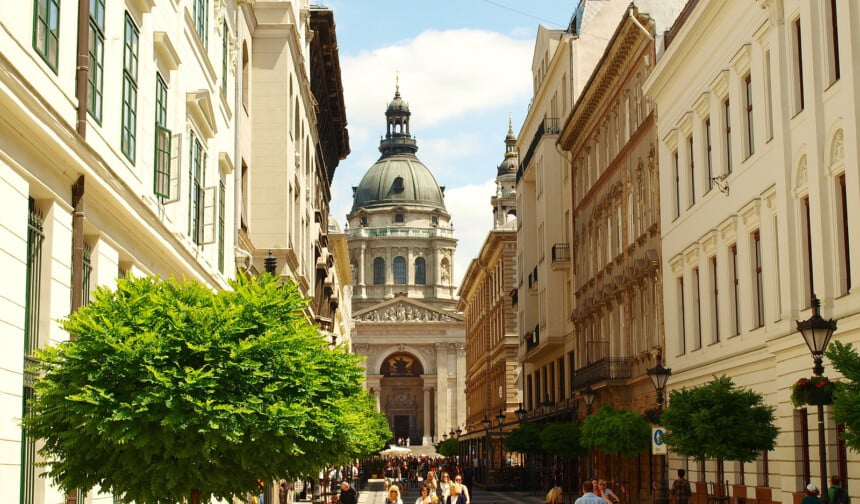April 18 marked the 70th anniversary of the signing of the Treaty of Paris, which established the European Coal and Steel Community. The leaders of France, West Germany, Italy, and the three Benelux countries thus laid the foundation for European integration. It was primarily meant to facilitate economic recovery, but also to help overcome old animosities, notably by promoting Franco-German reconciliation.
This arrangement was deepened with the creation of the European Economic Community (EEC) by the Treaty of Rome in 1957. The EEC worked well, fulfilling French President Charles de Gaulle’s vision of nation-states closely cooperating without compromising their sovereignty. All states would retain their substance and identity regardless of the institutional arrangement. This was the Europe pursued by de Gaulle and his immediate successor, Georges Pompidou.
However, in 1984 France’s Socialist President François Mitterrand declared that “we have to rid Europe of the Ten of its differences and lead it resolutely along the path to the future.” That path was cemented with the adoption of the Single European Act (SEA) in 1987. The SEA’s provisions greatly increased the power of the bureau-cratic apparatus in Brussels and paved the way for further political and economic in-tegration with a series of treaties limiting member states’ national sovereignty.
Thus the European Union evolved into a cultural Marxist “community of values” mostly run by unelected oligarchs. The transmutation is exemplified by the European Commission against Racism and Intolerance, founded in 1993.
This is one of many examples how the EU apparat actively promotes contemporary political and cultural orthodoxy, while denigrating the Old Continent’s authentic heritage. It is particularly obsessive about the promotion of effectively unlimited, mostly Muslim, immigration. The result is massive demographic shifts throughout much of Western Europe and Scandinavia.
Former Soviet Bloc countries, most notably Hungary and Poland, have meanwhile stood firm, rejecting mandatory migrant quotas. Having successfully resisted the Brussels-based EU bureaucracy ever since the migrant tsunami hit Europe, in late 2015 Hungary completed a barrier along its border with Serbia and Croatia, thus effectively ending the influx of migrants via the Balkans. Hungarian authorities unceremoniously deport illegals who still manage to enter, even though the European Court of Justice ordered Hungary to stop doing so.
After his fourth general election victory in 2018, Hungarian Prime Minister Viktor Orbán boldly escalated his clash with the EU apparat when he declared the era of liberal democracy to be over. “We have replaced a shipwrecked liberal democracy with a 21st-century Christian democracy,” he told deputies in his acceptance speech, “which guarantees people’s freedom, security, and supports the traditional family model of one man and one woman.”
Orbán further stated that the concept of liberal democracy had been replaced by “liberal non-democracy,” and that Brussels in its current form is incapable of addressing people’s problems.
In Poland the ruling Law and Justice Party follows much of Orbán’s rhetoric. Its leader and former Prime Minister Jarosław Kaczyński supports new forms of European integration based on greater cooperation between sovereign nations in a Christian Europe. Most Poles still support lifestyle choices compatible with the teachings of the Catholic Church, thereby rejecting Brussels’ influence, and the government of Mateusz Morawiecki remains unwav-ering in its rejection of migrant quotas.
The experiences of Hungary, Poland, and other former Soviet Bloc countries provides strong evidence that the one-party Communist regimes were less corrosive to a nation’s soul than Western-style liberalism. Those regimes controlled the state, but their ability to penetrate society was always limited. East Germans, Poles, and Hungarians all share a more resilient spirit of national identity, family, and communal values than their fellow Europeans west of the Iron Curtain.
The most painful European divide is that between the heart and the mind. It is manifested in the increasing abandonment of Christianity by residents of Western Europe. Unbelief results in the loss of man’s sense of place and history, and makes resistance to rationalistic humanism difficult. It also facilitates the spread of quasi-religious cults like climatism, transgenderism, and multiculturalism.
It is in the American interest that a united Europe returns. We share the same civilizational genes, and even if the corrosive effects of liberalism leave a permanent scar on the Old Continent, the game is not up. The embers of resistance in the East may rekindle the flame which will torch the Beast of Brussels. To paraphrase Dostoevsky, since God does exist, then everything is possible.
Image Credit:
above: Zrínyi Street and St. Stephen’s Basilica in Budapest, Hungary (Wikimedia Commons)

Leave a Reply